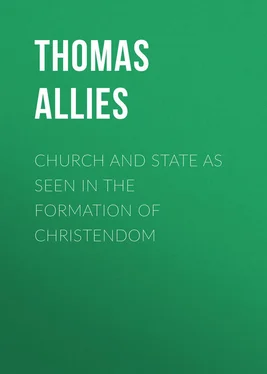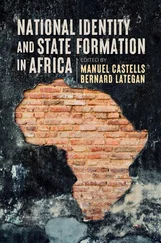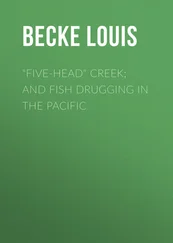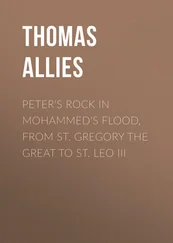Thomas Allies - Church and State as Seen in the Formation of Christendom
Здесь есть возможность читать онлайн «Thomas Allies - Church and State as Seen in the Formation of Christendom» — ознакомительный отрывок электронной книги совершенно бесплатно, а после прочтения отрывка купить полную версию. В некоторых случаях можно слушать аудио, скачать через торрент в формате fb2 и присутствует краткое содержание. ISBN: , Жанр: foreign_antique, foreign_prose, Историческая проза, на английском языке. Описание произведения, (предисловие) а так же отзывы посетителей доступны на портале библиотеки ЛибКат.
- Название:Church and State as Seen in the Formation of Christendom
- Автор:
- Жанр:
- Год:неизвестен
- ISBN:http://www.gutenberg.org/ebooks/38537
- Рейтинг книги:4 / 5. Голосов: 1
-
Избранное:Добавить в избранное
- Отзывы:
-
Ваша оценка:
- 80
- 1
- 2
- 3
- 4
- 5
Church and State as Seen in the Formation of Christendom: краткое содержание, описание и аннотация
Предлагаем к чтению аннотацию, описание, краткое содержание или предисловие (зависит от того, что написал сам автор книги «Church and State as Seen in the Formation of Christendom»). Если вы не нашли необходимую информацию о книге — напишите в комментариях, мы постараемся отыскать её.
Church and State as Seen in the Formation of Christendom — читать онлайн ознакомительный отрывок
Ниже представлен текст книги, разбитый по страницам. Система сохранения места последней прочитанной страницы, позволяет с удобством читать онлайн бесплатно книгу «Church and State as Seen in the Formation of Christendom», без необходимости каждый раз заново искать на чём Вы остановились. Поставьте закладку, и сможете в любой момент перейти на страницу, на которой закончили чтение.
Интервал:
Закладка:
Thus, not only the primary but the actual state of man in society springs out of an absolute unity. We have here to note two great truths. Adam, as he was expelled from paradise to till the earth and subdue it, was the head of his race in two particulars: first, as to natural society, whence springs civil government; and secondly, as to the worship of God, and the promises included in that worship, whence springs priesthood and all the fabric of religion. The two unities, the social and the religious, had in him their common root; and man thus comes before us in history as a family in which the first father stands at the head of the civil and religious order in most intimate intercourse with God. The only description which we possess of that first period of human society from the Fall to the Deluge, suggests to us a state which seems absolutely walled round by God with securities, both as concerns human life in the intercourse between man and man, and as concerns the purity of their worship of God. As to the first, have we not said all which can be said when we say that they were a family? The king of the human race was the father of every one in it. Certainly if any king could ever command the love and respect of his subjects it must have been Adam in that royalty.
But let us very briefly consider the bearing of man’s condition before the fall, as set forth to us in the sacred records which have been so far followed, upon his knowledge of divine and human things, and his moral state in his first society after the fall.
We have seen Adam in possession of a great dignity, created in the maturity of reason, exercising the full power of thought and speech as directed to truth by an inward gift, which conveys to him the knowledge of the creatures surrounding him; moreover, taught by God as to his present duties and future hopes. We have seen a wife bestowed upon him, who is, as it were, created for him and drawn from him, and a vast family promised to him. He is thus made father and head of his family and his race, and his Creator is his immediate Teacher. After his fall these privileges do not become to him as if they had never been. The memory of them all is complete in him, but a very large portion of their substance remains. Let us take three points, which are enough for our purpose. He receives, at the fall itself, firstly, a great promise of God; secondly, he becomes the Teacher and, thirdly, the Priest of his race. As to the promise, God declares to him that, as the result of the serpent seducing the woman to sin, He will create enmity between the serpent and the woman, the seed of the serpent and the seed of the woman; the seed of the woman should crush the serpent’s head; the serpent should lie in wait for his heel. All human history is gathered up in that division of the race, between the seed of the woman, from which springs the City of God, and the seed of the serpent, from which springs the City of the Devil. That is a communication of fresh knowledge to Adam, knowledge of good and evil, a mixture of consolation and sorrow. That is a disclosure of the issue of things stretching to the very end of the world, which comes to sustain Adam in his penitence, to complete the knowledge which he previously had of God and of himself.
In this first great prophecy, which embraces all the religion, the hope, and the destiny of man, the consequences of which are not yet worked out, man is treated as a race. The punishment falls on him as a Father; the Woman through whom it comes, the Mother of his children, points to another Woman and Mother, through whom it is to be reversed, and the Deliverer is to come to him as a Descendant.
Adam, then, was cast out of paradise, but not without hope, still less without knowledge, for he carried with him the knowledge which God had given to him, and the lesson of a great experience. Thus he became the great Teacher of his family. Through him from whom they received natural being and nurture, they received the knowledge of God, of their own end, of all which it behoved them to know for the purpose of their actual life. The great Father was likewise the great Penitent; and the first preacher of God’s justice to men told them likewise of His mercy: a preacher powerful and unequalled in both his themes.
But, by the fall, Adam became likewise the Priest in his family. We learn from the narrative of Cain and Abel that the worship of God by sacrifice had been instituted, and it is not obscurely intimated that it was instituted even before he was cast out of paradise, since God Himself clothed Adam and Eve with skins of beasts, which, doubtless, were slain in sacrifice, since they were not used for food. 7 7 St. Aug. cont. Faustum, 22, 17. Antiqua enim res est prænuntiativa immolatio sanguinis, futuram passionem Mediatoris ab initio generis humani testificans; hanc enim primus Abel obtulisse in sacris litteris invenitur.
The rite of bloody sacrifice, utterly unintelligible without the notion of sin, and inconceivable without a positive divine institution, so precise in its formularies about the statement of sin, and the need of expiation, is an everliving prophecy of the great sacrifice which God had intended “before the foundation of the world,” and a token of the knowledge which He had communicated to Adam before he became a father. Unfallen man needed to make no sacrifice, but only the triple offering of adoration, thanksgiving, and prayer. These Adam would have given before he fell; after his fall he became a priest, and the bloody sacrifice to God of His own creatures, a mode of propitiating God which man could never have invented or imagined of himself, is a token of the ritual enjoined upon him, and of the faith which it symbolised and perpetuated.
Such, then, was the condition of the children of Adam, the first human society, in those “many days” which passed before Cain rose up against Abel: the state of a family living in full knowledge of their own creation, being, and end, in vast security, for who was there to hurt them? worshipping God the Creator by a rite which He had ordained in token of a great promise, at their head the Father, the Teacher, and the Priest, with the triple dignity which emanates from the divine sovereignty, and makes a perfect government.
The two powers which were to rule the world rested as yet undivided upon Adam after his fall.
It is evident that nothing could be further from a state of savagery or barbarism, from a state of defective knowledge of God and man, and his end, than such a condition as this, which suggests itself necessarily to any one who considers attentively the sacred narrative.
But as Adam in paradise was left to the exercise of his free-will, and fell out of the most guarded state of innocence by its misuse, so the first-born of Adam broke out of this secure condition of patriarchal life through the same misuse, and begun by fratricide the City of the Devil. We are told that God remonstrated with him when he fell under the influence of envy and jealousy, but in vain. He rose against his brother and slew him; he received in consequence the curse of God; “went out from his face, and dwelt a fugitive on the earth at the east side of Eden.” There it is said that he built the first city, on which St. Augustine comments: “It is written of Cain that he built a city; but Abel, as a stranger and pilgrim, built none.”
The fratricide of Cain leads to a split in the human family. The line of Cain seems to depart from Adam and live in independence of him. It becomes remarkable for its progress in mechanical arts, and for the first example of bigamy. The end of it is all we need here note. In process of time, “as men multiplied on the earth,” two societies seem to divide the race of Adam – one entitled that of “the sons of God,” the other that of “the daughters of men.” But the ruin of the whole race is brought about by the blending of the better with the worse: the bad prevail, the two Cities become mixed together in inextricable confusion. God left to man throughout his free-will, but when the result of this was that “the wickedness of men was great upon the earth, and that all the thoughts of their heart was bent upon evil at all times,” that is, when the City of the Devil had prevailed over the City of God in that patriarchal race which He had so wonderfully taught and guarded, He interfered to destroy those whose rebellion was hopeless of amendment, and to make out of one who had remained faithful to Him a new beginning of the race.
Читать дальшеИнтервал:
Закладка:
Похожие книги на «Church and State as Seen in the Formation of Christendom»
Представляем Вашему вниманию похожие книги на «Church and State as Seen in the Formation of Christendom» списком для выбора. Мы отобрали схожую по названию и смыслу литературу в надежде предоставить читателям больше вариантов отыскать новые, интересные, ещё непрочитанные произведения.
Обсуждение, отзывы о книге «Church and State as Seen in the Formation of Christendom» и просто собственные мнения читателей. Оставьте ваши комментарии, напишите, что Вы думаете о произведении, его смысле или главных героях. Укажите что конкретно понравилось, а что нет, и почему Вы так считаете.












